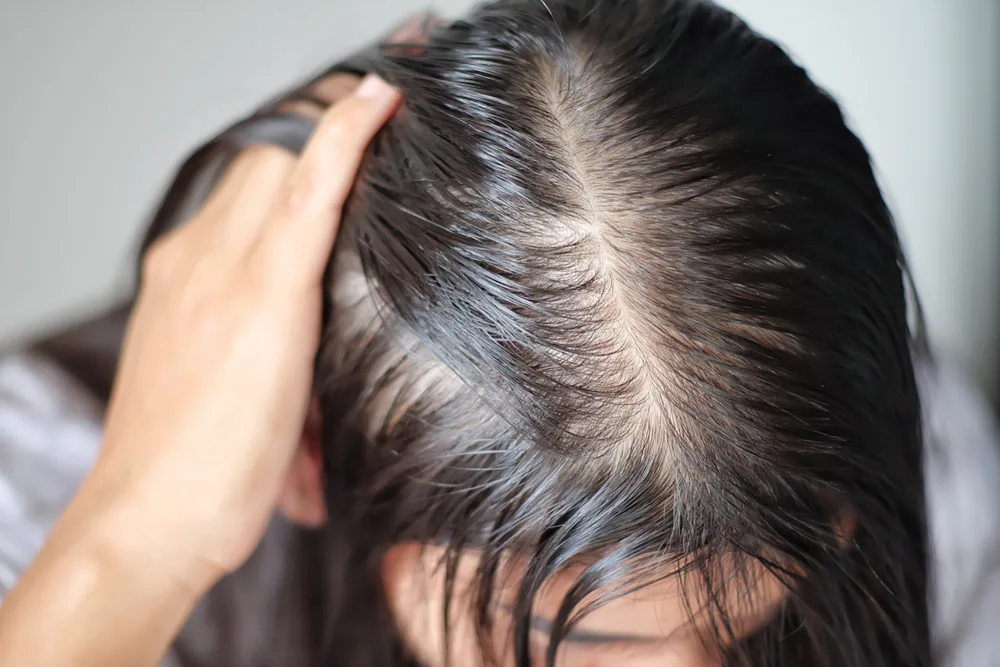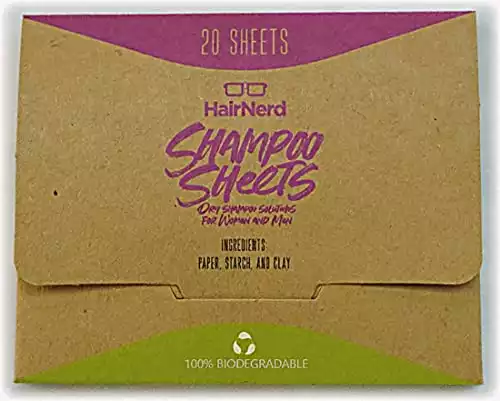Jump to:
Getting oil out of your hair isn’t always a walk in the park, but with these easy-to-follow tips, you can conquer oil and get your hair back to its clean, shiny self. A regular shampoo routine doesn’t always do the trick.
Whether you have naturally oily hair or trying to cleanse the leftovers of hot oil treatment, sometimes you need a little extra help to remove oil buildup. Here are a few tried and true ways to get oil out of your hair quickly and efficiently.
Getting Oil Out of Hair: A Summary
- Use a clarifying shampoo
- Wash several times
- Use dry shampoo
- Try home remedies for removing oil
- Use dish detergent as a last resort
- ‘Don’t forget to condition
The trick is to lift the oil off of your hair, without completely stripping your hair of its beneficial natural oils. Read on for the details.
How to Get Oil Out of Hair in 6 Steps
How you get oil out of your hair depends to some extent on how it got there. Is it natural oil produced by your scalp? We all experience oily hair now and then, especially if we’ve skipped shampoo day.
Our scalps produce sebum that comes from our hair follicles. Sebum is a normal occurrence, but some people make more than others, and the amount you produce can be affected by things like hormonal changes and weather.
When your scalp produces more sebum than usual, or when you’ve gone a few days without washing your hair, it’s common for the hair to take on a greasy, limp appearance. Fortunately, the easy fix for this problem is washing your hair and sometimes using products that absorb the oil.
Having some natural oils in your hair is essential for keeping it healthy and manageable. The method you use to remove oil from your hair should align with how much oil is in it.
You don’t want to overdo oil removal measures and make your hair dry and brittle. Let’s take an in-depth look at the steps you can take to eliminate the excessive oil from your hair.
1. Use a Clarifying Shampoo
Clarifying shampoo is one of the most effective regular habits you can get into to keep your hair free of oily buildup. These shampoos can also help rid your hair of environmental pollutants and non-greasy hair products.
It’s a great tool in your haircare arsenal; just be careful not to overuse them. Experts recommend using clarifying shampoo around once per month, although people who use lots of hair products may need to use them more often, up to once a week.
2. Wash Several Times
Most days, when you get into the shower, quickness is key. You want to get in, wash, and get out unless you have the time to take a long, luxurious spa shower.
The problem with the “hop in, hop out” method is that sometimes, you don’t wash your hair well enough. This is especially true if your hair is long, particularly oily, or you just used a saturating oil treatment.
If any of this applies to you, you probably need to do at least two shampoo passes on your hair. First, make sure your hair is thoroughly wet.
Oil and water don’t mix, so if you have a lot of oil in your hair, the water tends to sit on the surface at first rather than penetrating your hair. Next, lather your hair the best you can.
The first try may not produce much lather because the oil can inhibit lather, but don’t worry about that; just be sure you thoroughly massage the shampoo into your hair and scalp and rinse thoroughly. Repeat the process until your hair feels clean.
3. Use Dry Shampoo
This works on days when you don’t have time to shampoo or if your hair still feels oily after a shampoo. Simply spray on your chosen brand of dry shampoo, let it set for a few minutes, then brush it out until no more white powder is visible.
4. Try Home Remedies For Removing Oil
People with naturally oily scalps and people who use frequent oil treatments sometimes like to use natural, homemade hair treatments to remove excess oil from the hair. Here are three to try.
- Vinegar Rinse. Using a solution of half water and half vinegar, spray your hair roots to the ends and leave on for 15 minutes under a cap or wrap. You can use plain white vinegar or apple cider vinegar for this rinse. Many people prefer the latter because it doesn’t smell quite as strong.
- Egg Rinse. Did you know that eggs contain a natural compound called lecithin that helps break up dirt and oil in your hair? This makes an egg wash the perfect remedy for limp, oily strands. There’s no shampoo involved in the process. Just whip up a few eggs and apply evenly to your hair and scalp. Leave it on for about 20 minutes, then rinse completely with warm water. If the smell of raw eggs is a problem for you, you can add some essential oil to the mix before applying it.
- Baking soda Solution. Baking soda absorbs oil and exfoliates the scalp. If your hair has a lot of grease, using a baking soda paste will reduce it. Dissolve four tablespoons of baking soda in three-quarters of a cup of water, and mix until it’s a paste. Apply the paste to your hair and wait about 20 minutes. Rinse out thoroughly. This isn’t a treatment for everyone or one to be used frequently. Baking soda is abrasive and can damage hair if it’s overused.
5. Dish Detergent
Dish detergent is another method for getting grease out of hair. It’s a product made specifically for removing grease, so using it makes sense, but it contains harsh chemicals that can dry out and damage your tresses, so once again, it’s not a method to use all the time.
And we suggest using this method with extreme caution. It’s not meant for hair, so it’ll likely leave your hair dry, damaged, and brittle.
It’s more of a “last resort” measure if you’ve got a large amount of grease or oil in your hair and your regular or clarifying shampoo isn’t cutting it. Just use it as you would normal shampoo, and be sure to wash it out thoroughly.
Read Next: Can You Wash Your Hair With Dish Soap?
6. Don’t Forget to Condition
Regardless of how you remove excess oil from your hair, you must follow up with a good conditioner. It seems counterproductive, right? You just washed all this oil out of your hair, and now you’re supposed to put more oils into it?
In short, yes. Many of us tend to go overboard with washing because we want our hair to look clean and full of body. But this over-washing can lead to dullness, dryness, and brittleness.
According to the experts, you should really only be washing your hair 2-3 times per week, at most. Conditioner helps return healthy oils and emollients to your hair and prevents it from becoming overly dry.
When the scalp is too dry, it will produce more sebum to balance things out, and you’re back to greasy hair again! That’s why conditioning is so essential.
Frequently Asked Questions

Alon Za/Shutterstock
Below are the most frequently asked questions about how to get oil out of your hair.
Is there a way to get oil out of hair without any washing or rinsing?
If you’re camping, traveling, or away from a shower for whatever reason, dry shampoo is a lifesaver! If you don’t have any on hand, you can also try baby powder or cornstarch in a pinch. Let it sit on your hair for about 15 minutes and be sure to brush it out fully.
Should I put conditioner on my scalp if I have oily hair?
There’s some controversy over this, but generally, if your scalp already produces sufficient – or more than adequate oil – you may not need to condition your scalp every time you wash your hair.
Play it by ear. If you notice that your scalp tends to be greasy while the ends of your hair look dry, just focus on the ends. But keep in mind that an under-conditioned scalp can also produce excess oil, so don’t always neglect your scalp.
Do hats make your hair greasy?
We’ve all had the dreaded hat head. But you may have also noticed that your air gets greasier when you wear a hat. It’s not your imagination! Hats can prevent the scalp from breathing and can cause you to sweat where the band or brim meets the forehead.
There’s not much you can do about this phenomenon except wear a loose scarf instead of a hat when it’s cold or use some of the degreasing solutions we’ve presented above.
I don’t like dry shampoo sprays. Are there any alternatives?
Some people dislike dry shampoo sprays because they can be messy, highly fragranced, and in some cases, can irritate your lungs. Luckily, there are dry shampoo sheets!
These are blotting papers for your hair. They soak up excess oil, and they’re super convenient to use!
So, How Do You Get Oil Out of Hair?
Nobody likes limp, dull, oily hair. The good news is that with some simple methods, you can conquer greasy hair and keep your hair looking brilliantly shiny and clean. Happy styling!

